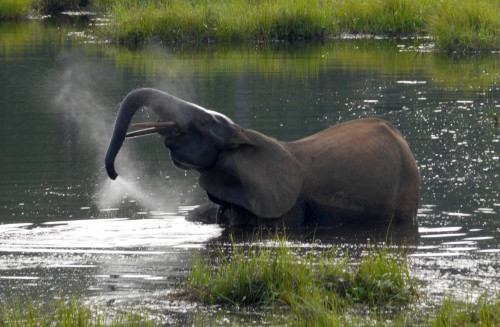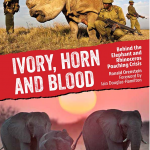
In a significant move to protect one of the world’s most cherished species, the U.S. Fish and Wildlife Service (Service) today completed a rulemaking process under the Endangered Species Act (ESA) to institute a near-total ban on the domestic commercial trade of African elephant ivory.
The rule, which fulfills restrictions outlined under President Obama’s 2013 Executive Order on Combating Wildlife Trafficking, substantially limits imports, exports and sales of African elephant ivory across state lines.
The rule is the latest of several actions implemented by the Service aimed at reducing the opportunities for wildlife traffickers to trade illegal ivory under the guise of a legal product.
“Today’s bold action underscores the United States’ leadership and commitment to ending the scourge of elephant poaching and the tragic impact it’s having on wild populations,” said Secretary of the Interior Sally Jewell, who serves as co-chair of the President’s Task Force on Wildlife Trafficking.
“We hope other nations will act quickly and decisively to stop the flow of blood ivory by implementing similar regulations, which are crucial to ensuring our grandchildren and their children know these iconic species.”
Wildlife trafficking reduces the economic, social and environmental benefits of wildlife while generating billions of dollars for organized criminal enterprises, contributing to an illegal economy, fueling instability and undermining security.
The final rule prohibits most commerce in ivory but makes specific, limited exceptions for certain pre-existing manufactured items — such as musical instruments, furniture pieces and firearms — that contain less than 200 grams of ivory and meet other specific criteria. Antiques, as defined under the ESA, are also exempt from the act’s prohibitions. This rule is limited to African elephant ivory and does not further regulate ivory derived from other species, such as walrus, whale and mammoth.
“Since we proposed this rule in 2015, we received more than 1.3 million comments from the public, demonstrating that Americans care deeply about elephants and overwhelmingly support African elephant conservation,” said Service Director Dan Ashe.
“Our actions close a major avenue to wildlife traffickers by removing the cover that legal ivory trade provides to the illegal trade. We still have much to do to save this species, but today is a good day for the African elephant.”
Federal law enforcement investigations demonstrate that wildlife traffickers have exploited prior regulations allowing for legal trade in ivory.
Under current laws, once illegal ivory enters the market, it becomes nearly impossible to distinguish from legal ivory, limiting the effectiveness of law enforcement efforts to intercept black market shipments and catch traffickers. The new rule will provide federal agents with clearer lines of demarcation to identify illegal ivory.
Desire for elephant ivory, mostly in Asia, is so great that it grossly outstrips the legal supply and creates a void in the marketplace that ivory traffickers are eager to fill. Perpetuating legal trade only serves to stimulate this consumer demand and further threaten wild elephant populations.
During a recent three-year period, an estimated 100,000 elephants were killed for their ivory, an average of approximately one every 15 minutes, and poaching continues at an alarming rate. The carcasses of illegally killed elephants now litter some of Africa’s premiere parks. Elephants are under threat even in areas that were once thought to be safe havens.
During the last year, the Service consulted extensively with groups that will be impacted by the new trade controls for ivory. The rule provides detailed guidance on the transportation and trade in limited types of ivory products that are still allowed. The Service will provide additional implementation guidance on the rule before it goes into effect July 6, 2016, 30 days following publication in the Federal Register.
“We listened carefully to the legitimate concerns raised by various stakeholder groups and, as a result, are allowing commonsense, narrow exceptions for musicians, musical instrument makers and dealers, gun owners and others to trade items that have minimal amounts of ivory and satisfy other conditions,” said Ashe. “These items are not drivers of elephant poaching and do not provide cover for traffickers.”
This rule is the latest in a suite of actions taken by the Administration to combat wildlife trafficking including:
- Securing corporate commitments to stem trafficking through the U.S. Wildlife Trafficking Alliance;
- Developing international partnerships with range and demand countries;
- Law enforcement operations such as Operation Crash;
- Drafting of the Trans Pacific Partnership Agreement, which is currently under public and congressional review and includes the strongest international commitments to fight the illegal trade in endangered species of any trade agreement in history.
The final rule will publish in the Federal Register June 6, 2016, at which time it will be available at www.regulations.gov under docket no. FWS–HQ–IA–2013–0091. For more information on the final rule, please see http://www.fws.gov/international/pdf/questions-and-answers-african-elephant-4d-final-rule.pdf.




